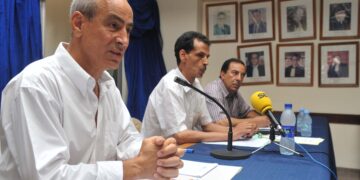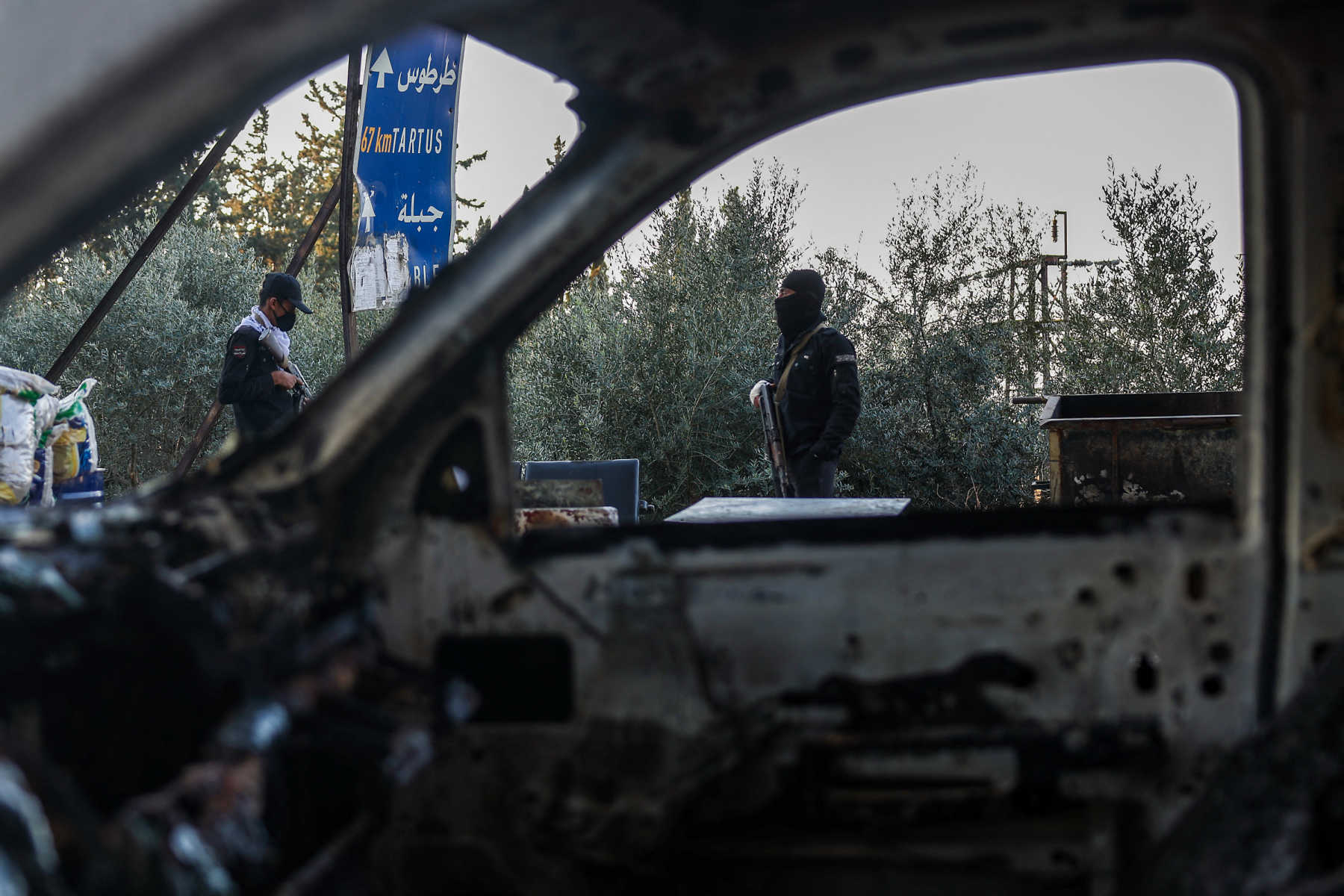U.S. forces engaged in combat operations over Jordan skies endangering civilians
(Washington D.C., October 24 , 2024): The United States government should establish a timetable for withdrawing all of its 3,813 military personnel from Jordan, in line with the the recent agreement between Iraq and the U.S. for a withdrawal of U.S. forces by the end of 2026, said DAWN today.
Since the outbreak of the Gaza War in 2023, the U.S. has significantly expanded its combat operations in the region to support Israel, inviting escalating counterattacks on U.S. forces in Jordan, harming civilian property there, and endangering Jordanian civilians.
"U.S. military forces in Jordan are endangering the country's citizens, as the Biden administration's combat operations to support Israel are inviting retaliatory attacks on U.S. forces in Jordan," DAWN's Executive Director, Sarah Leah Whitson, said. "The Jordanian government has a responsibility to protect its citizens and avoid engulfing the country in a broader regional war; the best way it can do this is by urging U.S. forces to leave."
U.S. Military Forces in Jordan
The U.S. has had military forces present in Jordan at least since April 19, 2013, when then Secretary of Defense Chuck Hagel publicly ordered the deployment of American troops to Jordan as a "preparatory step to secure Syrian chemical weapons facilities." On June 13, 2016, then President Barack Obama informed Congress that "approximately 2,200 U.S. military personnel are deployed to Jordan… at the request of the Government of Jordan" but gave no time limit to the deployment, explaining that "these forces will remain in Jordan, in full coordination with the government of Jordan, until the security situation becomes such that they are no longer needed." With the decrease of U.S. hostilities in Syria and Iraq in 2017 and 2018, the U.S. reduced the number of American personnel in Jordan, but increased them again from 3188 in December 2023 to 3813 in June 2024.
In 2021, Jordan and the U.S. signed a Defence Cooperation Agreement (DCA), formalizing the legal terms governing the presence of U.S. forces and personnel in the country and authorizing them to undertake military operations from the country as the U.S. deems necessary. The agreement identifies at least twelve stations where U.S. forces and personnel are to be based, including: the Muwaffaq Salti Air Base in Azraq; the Joint Training Center Complex; the Jordan Armed Forces (JAF) Training Base at Humaymah; King Abdullah Marka Air Base; the Royal Jordanian Naval Base in the Port of Aqaba; the JAF Training Base at Al Quwayrah; the King Abdullah Special Operations Training Center; Prince Hasan Air Base (also known as "H5"); various military border posts; King Faisal Air Base (also known as "Al Jafr"); Camp Titin, south of Aqaba; and King Abdullah II Air Base.
A recent report also documented the presence of secret American bases across the Middle East, including in Jordan, but U.S. officials declined to confirm the information citing operational confidentiality. Several attacks on U.S. forces at other locations, however, suggest that U.S. military forces have in fact been present at several other unannounced bases. This includes the January 2024 attack by Iraqi militants on Tower 22, an unofficial U.S. military base in Jordan; the 2015 attack on U.S. forces at a police training center in Al Muwaqqar, 20 miles southeast of Amman, a few months after the U.S. started training Syrian opposition fighters in Jordan; and the 2016 attack on U.S. forces at Al Jafr King Faisal Air Force Base, 160 miles southeast of Amman, all of which took place before the DCA was signed.
It is unclear exactly what weapons and equipment the U.S. has located in Jordan. A 2018 report stated that "publicly available commercial satellite imagery indicates the presence of potential U.S. reaper drones at other bases in Jordan, but this is not acknowledged by the United States."
The Jordanian government also may have failed to comply with Jordanian law requiring parliament to approve international agreements that infringe on Jordanian rights. Neither the King nor the Jordanian government officially notified Jordan's Parliament or sought its approval before announcing the effectiveness of the agreement. Article 33 of Jordan's constitution, states that: " international agreements or accords that entail infringement of private or public Jordanian rights are not valid unless approved by the Parliament." Arguably, the DCA infringes on Jordanian rights by requiring the Jordanian government to protect foreign troops, and allowing these foreign troops to carry out military operations in the country. Rather than seek parliament's input, however, the government only notified parliament about passage of the DCA by publishing it in the official government gazette.
"The very least King Abdullah should have done was to ask parliament for permission to host U.S. forces in the country, in light of how dangerous their presence is to Jordanian citizens," said Raed Jarrar, DAWN's advocacy director. "Today we see exactly how these U.S. forces are dragging Jordan into Israel's conflict and endangering everyone in the country," added Jarrar.
The DCA specifically authorizes U.S. armed forces to use military force in Jordan to protect its forces from attack or to respond to an "immediate security threat." Article 6 states that "Jordan recognizes the inherent right and obligation of U.S. military commanders to secure the security and safety of personnel and equipment under their supervision and understands that U.S. military commanders have an inherent right of self-defense and may respond as necessary to an immediate security threat." It also requires Jordan's government to protect U.S. military forces in the country:
Jordan shall take such reasonable measures as are necessary to ensure the protection, safety, and security of U.S. personnel and U.S. contractors, and the protection and security of U.S. property and official U.S. information, including from seizure or conversion for the benefit of any party other than the United States. In furtherance of this responsibility, the parties or the Executive Agents shall cooperate closely to ensure that such protection, safety, and security are provided.
While Jordan's Foreign Minister Ayman Safadi stated on March 21 that the DCA "does not authorize American forces to carry out combat actions within the Kingdom," in fact, the DCA specifically authorizes such combat operations if the U.S. deems such operations to be in "self-defense" or in response to an "immediate security threat."
In addition, Article 18 of the DCA precludes Jordan's ability to seek legal remedy for breaches of the agreement in a court of law: "Disputes that the Executive Agents cannot solve shall be referred to the Parties for consultation and resolution, as appropriate, and shall not be referred to any national court, or to any international court, tribunal, or similar body or to any other third party for settlement."
U.S. Combat Capacity and Attacks on U.S. Forces in Jordan
Since the outbreak of the Gaza War in 2023, the U.S. has significantly expanded its combat operations in the region to support Israel, inviting escalating counterattacks on U.S. forces and endangering Jordanian civilians. While the Jordanian government has complained about the escalating war in the region, argued that the DCA does not authorize U.S. combat operations in Jordan, and maintained that it is neutral in the war, these pronouncements have not served to protect Jordanians.
Jordan has already found itself stuck in the crossroads of Israeli and Iranian attacks and counterattacks, and participated with the United States to shoot down missiles and drones headed to Israel. On October 21, Jordanian authorities announced that they shot down a drone that appeared in a group of drones in the Jordan skies, between Jumha and Kufr A'an, 20 miles from the Jordan-Israel border; there were no reports of casualties or property damage. Israel also announced that it had intersected drones coming from the east.
On October 1, 2024, U.S. forces and other allied forces, including Jordan, participated in intercepting Iranian ballistic missiles directed at Israel. Debris of the intercepted missiles fell on Jordanian cities and towns. The Jordanian government has not yet provided an account of property damage caused by the hostilities, but in an official statement, Mohamad Al Momany, the government spokesman, acknowledged three minor casualties, and said that "Jordan will not be a battlefield for any one." On April 13, 2024, U.S. forces also intercepted Iranian projectiles, causing debris to fall over highly populated areas in the country.
This year, there have also been multiple attacks on U.S. forces in the country, and threatened attacks on Jordan, endangering Jordanians civilians and their property. Following Jordanian and U.S. interceptions of drones and missiles targeting Israel, Iran's semi-official Fars news agency said that King Abdullah II could be "the second target" if he persisted in supporting Israel's war effort. The Jordanian government summoned the Iranian ambassador to officially complain about these threats, and insisted that Jordan is neutral in the war and would not be an "arena" for conflict between Iran and Israel.
On September 29, 2024, the Jordanian military announced that a Grad missile launched from southern Lebanon fell in an area near Al Muwaqqar devoid of people and facilities, and on September 17 announced it downed a drone in southern Jordan. In August, Jordanian armed forces also announced that they had shot down three drones carrying explosive materials, weapons and narcotics.
The most serious attack on U.S. forces this year took place at the beginning of the year. On January 28, 2024, a drone strike on U.S. military forces near "Tower 22" in Al Rukban, at the Jordanian-Iraqi-Syrian border, injured 24 and killed three American soldiers: Sergeant William Rivers, Specialist Breona Moffett and Specialist Kennedy Sanders. The U.S. blamed Iranian-backed forces, claiming that the attack carried the "footprints" of the Tehran-sponsored Kataib Hizballah. The U.S. Air Force then carried out retaliatory attacks on militia targets in Iraq and Syria on February 2 using "long-range B-1 bombers flown from the United States." A senior American official confirmed that Jordan participated in the operation, but the Jordanian military denied this, and reiterated that Jordan respects the sovereignty of its "brethren in Iraq."
There have been other attacks on U.S. forces in prior years, reflecting public anger at their presence in the country. On November 4, 2016, Jordanian Sergeant Maarik Al-Tawaiha, 39, shot dead three American military personnel, Staff Sergeant Matthew Lewellen, 27; Staff Sergeant Kevin McEnroe, 30; and Staff Sergeant James Moriarty, 27, in Al Jafr King Faisal Air Base, 160 miles southeast of Amman. Jordanian security forces detained and tried Al-Tuwaiha, sentencing him in July 2017 to life in prison. Despite the U.S. denial that the soldiers disobeyed a Jordanian soldier's order, many Jordanians widely believe that the American trainers provoked the attack, and the trial triggered public debate revealing widespread Jordanian opposition to the U.S. military presence in their country.
On November 9, 2015, Anwar Abu Zaid, a 28-year-old married police captain also killed six personnel at the Al Muwaqqar Training Center, including two American military contractors, James Creach and Lloyd Fields Jr., who were employed by DynCorp International,, which hosts many training programs funded by the U.S. for police forces from Iraq, Jordan, Lebanon, and Palestinian Authority. Abu Zaid, a university graduate with two children, hailed from the northern Jordanian village of Rimoun, and was described as "religious but moderate. His uncle, Sulaiman Al Saad, an Islamist and a member of Jordan's Parliament in 2015, denied that his nephew was a member of any terrorist group. Around two thousand people attended his funeral, and some consider him a "martyr" and chanting slogans against America and Israel, other relatives accused the American trainer of killing their son and asked for an independent investigation of the incident, many Jordanians claimed that the American military contractors provoked him during a dispute.
U.S. Military Forces in Jordan and Military Aid to Monarchy Encourage Government Repression
The expanded U.S. military forces in Jordan, alongside the $1.45 billion annual military and economic aid to the Kingdom, also have served to validate the increasing concentration of power by the country's monarchy. Months after Jordan signed the 2021 DCA, King Abdullah expanded his constitutional powers by creating the National Security and Foreign Policy Council, which gives the king exclusive authority on security, defense and foreign policy issues. The King heads the council and appoints its members, which includes the prime minister, ministers of defense, foreign affairs, and Interior, the Army Chief of Staff, the General Intelligence director, Public Security director, and two other members appointed by the king.
In addition, in April 2016, during a visit of the then commander of the U.S. Central Command, General Joseph Votel to Jordan, King Abdullah II amended the constitution, granting himself the sole power to appoint the president and the members of the Senate, the president and members of the Constitutional Court, the president and the members of the Judiciary Council, in addition to the the Crown Prince and the Viceroy.
Previously, after the U.S. officially announced its military deployment to Jordan in April 2013, King Abdullah II amended the constitution in 2014 to grant himself exclusive power to appoint and dismiss the heads of the Army and General Intelligence Department. The King justified the amendment as a way to "enhance political neutrality" and protect the Army and the intelligence department from "influencing or being influenced by political tensions and partisan bickering."
"The American military presence in Jordan and billions in military assistance have fostered the monarchy's impunity, transforming the royal family into a supra-state entity," said Jamal Al Tahat, DAWN's Senior Advisor. "The only way to enhance Jordan's stability and neutrality, and protect it from becoming entangled in the region's escalating wars, is to transform Jordan into a real, full-fledged democracy," concluded Al Tahat.
DAWN urges the US administration to design a reasonable timetable to end the American military presence in Jordan, reminding American lawmakers that U.S. forces should serve to protect the U.S., not shore up King Abdullah.
















![Security forces loyal to the interim Syrian government stand guard at a checkpoint previously held by supporters of deposed president Bashar al-Assad, in the town of Hmeimim, in the coastal province of Latakia, on March 11, 2025. Syria's new authorities announced on March 10, the end of an operation against loyalists of deposed president Bashar al-Assad, after a war monitor reported more than 1,000 civilians killed in the worst violence since his overthrow. The Syrian Observatory for Human Rights said the overwhelming majority of the 1,068 civilians killed since March 6, were members of the Alawite minority who were executed by the security forces or allied groups. (Photo by OMAR HAJ KADOUR / AFP) / “The erroneous mention[s] appearing in the metadata of this photo by OMAR HAJ KADOUR has been modified in AFP systems in the following manner: [Hmeimim] instead of [Ayn Shiqaq]. Please immediately remove the erroneous mention[s] from all your online services and delete it (them) from your servers. If you have been authorized by AFP to distribute it (them) to third parties, please ensure that the same actions are carried out by them. Failure to promptly comply with these instructions will entail liability on your part for any continued or post notification usage. Therefore we thank you very much for all your attention and prompt action. We are sorry for the inconvenience this notification may cause and remain at your disposal for any further information you may require.”](https://dawnmena.org/wp-content/uploads/2025/04/syria-22039885951-350x250.jpg)




















